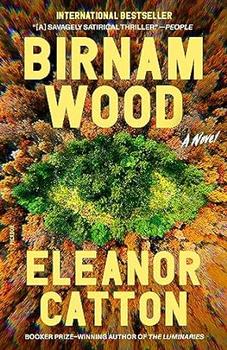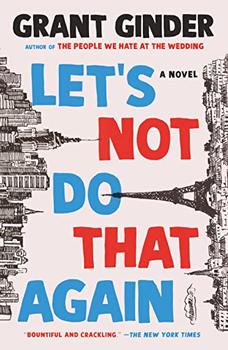Summary | Excerpt | Reading Guide | Reviews | Beyond the book | Read-Alikes | Genres & Themes | Author Bio

A Novel
by Eleanor CattonEleanor Catton's The Luminaries, which won the Booker Prize in 2013, was notable not only for being the longest book to be awarded the prize (at 800+ pages) but also for its author, just 28 at the time, being the youngest winner ever. More subjectively, The Luminaries is that rare novel that's both exquisitely crafted and a real literary tour de force, while also being a ripping good yarn. It's taken Catton ten years to publish a subsequent novel, but have no fear—Birnam Wood offers the same combination of rollicking storytelling undergirded by genuine intellectual engagement (and don't worry—this one's only about half the length).
Catton's new novel is set in New Zealand in 2017, in the wake of a massive landslide that has almost entirely cut off access to a tract of land, known as Thorndike, adjacent to a national park. The Thorndike estate, owned by recently knighted Sir Owen Darvish (who made his fortune in pest control), had been slated to be divided into individual plots of land for a subdivision. Due to the landslide, though, which will supposedly take years to clear, the property has become significantly less valuable to would-be suburban homeowners.
It has, however, caught the attention of Mira Bunting, an activist horticulturist in her late 20s. Mira is the founder of a collective known as Birnam Wood, who—at least on their website—are a group of idealistic young volunteers who gladly turn underused backyards and office park lawns into flourishing gardens, sharing the harvest with the landowners generous enough to lend their plot of earth. Unbeknownst to the public, however (and even to many of the group's members), Birnam Wood is also engaged in guerilla farming on public lands, and on properties that are too vast for their owners to adequately monitor for any unapproved activity. When Mira hears about the abandonment of real estate development plans in Thorndike, the seed of an idea plants itself in her imagination.
Mira is not the only one with her eye on Thorndike's potential. American billionaire Robert Lemoine is CEO of the company Autonomo, maker of surveillance drones. According to his initial conversations with the Darvishes, Lemoine is just the latest member of the super-rich to identify rural New Zealand as the perfect place to build a luxury bunker to ride out the coming apocalypse—and Thorndike seems like the ideal location. However, he has other reasons for wanting a presence in Thorndike, reasons he'd like to keep secret. So when his drones (naturally) spot Mira poking about Thorndike's perimeter, he decides to make her an offer she can't refuse—even if it's not really his place to make it.
Mira and Lemoine are a delightfully mismatched pair, and readers will relish seeing the ways in which they dance around one another while also using one another. Mira, although ostensibly the selfless do-gooder, is in many ways just as conniving and calculating as Lemoine, who comes off, as the story progresses, as ethically bankrupt but at least honest about it. Theirs is just one of the richly complicated relationships at play as Catton's drama unfolds—there's Mira's old flame Tony, newly returned from several years teaching abroad and eager both to impress her with his ideological purity and, in his new role as investigative blogger, to get to the bottom of the highly secretive Darvish/Lemoine land deal. And there's the push and pull of Mira's long-time collaboration with her friend, roommate and business partner Shelley, who longs to escape from Mira's thrall but keeps getting pulled back in—perhaps with disastrous results.
Birnam Wood unfolds quickly—even the political and ideological debates proceed at a snappy clip—and is frequently extremely funny, even after tragedy ensues. But it's also deeply engaged with political and economic concerns, pointing out at every turn the borderline absurdities of where the current climate of inequality and monetization has gotten us, and then using those absurdities to further the plot. Once again, Catton has constructed a novel that succeeds both intellectually and emotionally.
![]() This review was originally published in The BookBrowse Review in April 2023, and has been updated for the
March 2024 edition.
Click here to go to this issue.
This review was originally published in The BookBrowse Review in April 2023, and has been updated for the
March 2024 edition.
Click here to go to this issue.

If you liked Birnam Wood, try these:

by Grant Ginder
Published 2023
From Grant Ginder, the author of The People We Hate at the Wedding, comes Let's Not Do That Again a poignant, funny, and slyly beguiling novel which proves that, like democracy, family is a messy and fragile thing - perfect for fans of Veep's biting humor, the family drama of Succession, and the joys of Kevin Wilson's Nothing to See Here.

by Elizabeth McKenzie
Published 2016
An exuberant, one-of-a-kind novel about love and family, war and nature, new money and old values by a brilliant New Yorker contributor
Your guide toexceptional books
BookBrowse seeks out and recommends the best in contemporary fiction and nonfiction—books that not only engage and entertain but also deepen our understanding of ourselves and the world around us.